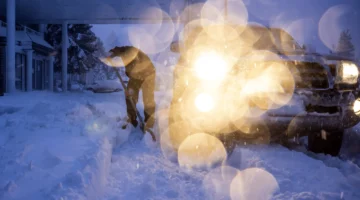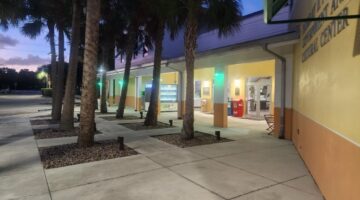Highlights from the USDA’s Rural Solar Program
Federal Government and National Nonprofit Help Farms & Factories Go Green
Baroda, Michigan – The national non-profit Solar United Neighbors (SUN) celebrates the expansive reach and enhanced benefits of the Rural Energy for America Program (REAP), shining a light on solar success stories that span from the manufacturing heartlands of Michigan to the sun-soaked fields of Florida, and from the resilient agricultural landscapes of Minnesota to the picturesque mountains of West Virginia.
The Rural Energy for America Program (REAP), initiated by the USDA, serves as a cornerstone for this rural energy transformation, offering financial support for the adoption of renewable energy and energy efficiency improvements. The program, bolstered significantly by the Inflation Reduction Act, now offers increased grants and loans, making solar installations more accessible than ever. Within this framework, SUN stands as a beacon of support, guiding businesses and farms through the application process and fostering a community dedicated to sustainable energy.
Here are some highlights from SUN’s involvement with REAP across the country:
- Michigan’s Manufacturing Sector As A Solar Success Story:
Adam Schaller of Lakeshore Die Cast in Baroda became a local pioneer by integrating solar power into his business operations, inspiring a green energy movement within his community. This venture not only optimized his company’s energy usage but also served as a testament to solar power’s viability in regions not traditionally known for abundant sunshine. Schaller’s story, reflecting a shift toward sustainability, has resonated throughout the village, encouraging a collective embrace of renewable energy through REAP by many neighboring businesses in all sorts of industries. Check out this video about his renewable energy journey and the impact that it’s had on this community.
“We offset 100 percent of our costs. I sell more power than I buy, making money in the process on top of displacing my costs,” Schaller said. “There was this realization that we could do more than just manufacturing; we could be a part of a larger movement towards renewable energy.”
- Minnesota’s Agricultural Commitment to Solar Energy:
Art Thicke’s Enchanted Meadows dairy farm in LaCrescent and Stuart Lavalier’s Grand Rapids berry farm showcase how solar energy can be a game-changer for the agricultural sector, providing energy independence and financial stability. Thicke highlights the transformative nature of solar power: “Adopting solar energy was a crucial step in securing our farm’s future, mitigating energy costs, and contributing to environmental conservation.”
“Going solar eight years ago is one of the best decisions I have made since I started farming,” said Thicke. “We have enough solar panels to produce the electricity we use so our energy costs are fixed. When energy prices go up we don’t notice. Farmers looking to control costs and increase sustainability should take advantage of REAP and other programs to go solar.”
“We’re seeing a negative number on our electric bill,” Lavalier said. “We don’t have a huge electricity bill but the solar covers it. . . .We’ve been getting a check back each month of about $300.” Lavalier added his 27.3 kW solar array through REAP “to do what’s right, to grow more on the farm than just berries.”
- Florida’s Rural Businesses Harness Solar Power:
The story of John Kocol’s Island Hammock pet hospital in Key Largo exemplifies the growing trend of rural businesses turning to solar energy. Encouraged by REAP’s enhanced incentives, Kocol’s transition to solar represents a broader movement toward sustainability and energy independence in rural America. His experience underscores the potential for solar energy to provide substantial cost savings and operational benefits, even in already sunny locales.
- West Virginia Showcases Solar Versatility:
East West Printing in Tucker County and Still Hollow Spirits in Randolph County illustrate the versatility and impact of solar energy on diverse rural businesses.
Thanks to REAP, Alice Fleischman integrated solar power seamlessly into her printing company’s operations. “We’ve always been interested in solar energy, but it wasn’t until we learned about the Rural Energy for America Program (REAP) that we saw a viable path forward. With the assistance of a REAP grant covering 30% of the installation costs, we took the plunge,” she said. “To fellow rural businesses considering solar, my advice is simple: don’t expect miracles overnight, but investing in long-term sustainability pays dividends, both environmentally and economically.”
Athey Lutz likewise modernized his company through this program. “Our distillery’s shift to solar power has not only decreased our energy costs but has also aligned our business practices with our core values of sustainability and community support,” he said. “Solar United Neighbors made navigating the REAP grant process manageable, and I encourage other rural businesses to explore this opportunity.”
More Information:
As part of its mission to help people go solar, national nonprofit Solar United Neighbors (SUN) has launched “Ready, Set, Solar, REAP!” This initiative is focused on helping applicants navigate the USDA’s Rural Energy for America Program (REAP) application process.
REAP offers grants and loans to make solar more affordable. These grants are for up to 50% of the system cost and loans are available through a competitive application process. The Inflation Reduction Act quadrupled funding for the program. The USDA has also increased the number of application windows per year to four (quarterly) through 2024. This means there is more opportunity to secure funding to add solar to farms and rural businesses.
“If you own a farm or rural small business and have thought about going solar, now’s your chance,” said Anya Schoolman, Solar United Neighbors Executive Director. “Going solar lets you lower and control your energy costs. We’re excited to offer this first-of-its-kind guide to bring more solar power to rural communities.”
The USDA accepts applications throughout the year. The next deadline is March 31. The other dates in 2024 are June 30 and September 30.
“Ready, Set, Solar, REAP!” is a free program designed to make the application process easier by offering step-by-step guidance over 10 weeks to complete and submit a USDA REAP grant.
Those interested can join Ready, Set, Solar, REAP online here.
As part of the program participants receive:
-
-
A week of emails introducing the REAP grant process and a REAP guide, followed by an email a week with bite-size to-do’s for the remaining 9 weeks
-
-
Unbiased, installer-neutral advice and expertise
-
Support from a network of peers, including SUN staff and previous REAP grantees
Solar United Neighbors has helped dozens of applicants apply for a REAP grant or loan. By highlighting these inspirational stories from Michigan, Minnesota, and Florida, SUN and REAP are not just advocating for solar energy but are actively participating in the rural renaissance of renewable power, proving that sustainability is within reach for communities nationwide.
To empower and educate potential REAP beneficiaries, SUN has curated an extensive suite of additional free resources:
-
An on-demand webinar ‘REAP Solar Grants & Your Rural Business’, in English and Spanish
-
Solar Help Desk with hands-on support
-
USDA website map to see if a rural business is in an eligible area (NOTE: qualifying farms are available regardless of location)
-
USDA REAP FAQ (at the bottom of the page)
About Solar United Neighbors
Solar United Neighbors is a nonprofit organization that works nationwide to represent the needs and interests of solar owners and supporters. Solar co-ops are part of the organization’s mission to create a new energy system with rooftop solar at the cornerstone. Solar United Neighbors holds events and education programs to help people become informed solar consumers, maximize the value of their solar investment, and advocate for fair solar policies.
[livemarket market_name="KONK Life LiveMarket" limit=3 category=“” show_signup=0 show_more=0]



No Comment